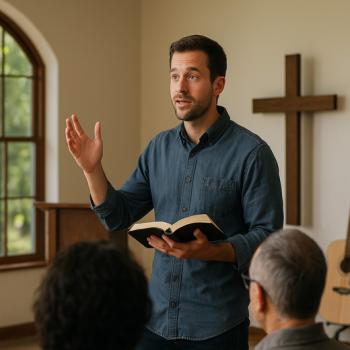Brian, thanks so much for the chance to have this conversation. One last question for you grows out of this talk about conflict, and out of our continuing difficulty in finding common ground even among fellow disciples of Christ. In The Other Jesus, I quote my bishop, Andy Doyle, who told me that the greatest problem facing the Church is our inability to model love and reconciliation for a broken world. What does your study of Christian spirituality suggest would help make us reconcilers and more truly Christian?
Brian: Greg, if I could point to one thing, it would be the confession of sin. It's odd, I think, that so many of our churches emphasize confession, but our behavior shows we aren't really doing it. If we did—if we really faced our own failures, shortcomings, addictions, blind spots, ugly character traits, unresolved wounds and bitterness, and so on—we would find it impossible to be so unkind to others. How can I judge my brother when I know, and feel, how much God has forgiven me? How can I be impatient with my brother when I know how patient God has been with me?
Some years ago, a close friend betrayed me. It was one of the meanest things anyone has ever done to me, and what made it worse, this friend wanted to just pretend the whole thing never happened. I was devastated. In the middle of all this, when I was really raw and falling apart and grieving, I had to lead a Bible study on the woman caught in adultery, that contested story from John's gospel. In the process of engaging with that text, I saw my friend as the woman, and I had to decide if I would throw the first stone. And of course I melted. I couldn't do it. And so I forgave that friend, and eventually, some sincere remorse was expressed, and today, our friendship is stronger than ever. This is so close to the heart of the gospel, yet in spite of our including "Prayer of Confession" in our liturgies, I don't think we really work on this.
In Naked Spirituality, I call this the practice of regret, lodged in the simple word "sorry." I think we have a long way to go in seeing what this means in our lives, individually and corporately. Ironically, it's right there in the Lord's Prayer, which also gets said a zillion times a week in Christian churches around the world: forgive us our sins as we forgive those who sin against us. You'd think, repeating those words as often as we do, that we would put a lot of focus on reconciliation in our churches. But we say the words without engaging our hearts, I think, and in that way, the words probably do us more harm than good, since they anesthetize us and saying them makes us feel holier than we are.
But the good news is that if we take this seriously, I really think big changes will follow!
Greg, in closing, I wanted to offer one last reflection. A few years ago, someone wrote a little typology of different types of Christians, and he put me (and I think he would also put you) in a category he called "revisionist." He meant this as a negative thing—as if we were trying to revise Christianity to be more to our liking, easier, less challenging, more watered-down, and so on. So of course, I wanted to defend myself: "I'm not revisionist!" But the term has stuck with me. Of course I reject the judgment implicit in the term from this fellow's perspective: I'm not interested in watering down the faith. If anything, I want to acknowledge how much it has already been watered down, and I want to see the water turned into wine! But putting that aside, if "revision" means "get a fresh vision of," then I think the term fits. We're seeking a fresh vision of our faith. In The Other Jesus, you're getting a fresh vision of Jesus, and in Naked Spirituality, I'm trying to get a fresh vision of life with God. I wondered if you had any closing reflections on that idea of getting a fresh vision.
Greg: Brian, thanks for foregrounding the primacy of forgiveness. Being Lent, I've been talking a lot about the Desert Fathers and Mothers lately, and forgiveness is one of the primary lessons we get from them. Forgiveness—over and over again—seems to be the only way we can live in community, or in the world.
I'll gladly accept that "revisionist Christian" characterization as you describe it, and I can testify that fresh vision is what led me to new and vital faith, although I think I'd like to switch senses and talk about listening and new hearing. What I think many people have in common in their own journey to revisioning faith is a willingness to listen to God. During my own desert times—especially when I was realizing that if God wasn't real and there was nothing more than my own painful and finite life, I was doomed, I spent a lot of time listening. I had been really big into the two types of prayer Anne Lamott describes as "help me" and "thank you." During those times of perplexity, my prayer was both calmer and more desperate: "Say something. Anything. Let me know you're there. Let me know what you want and I'll do it."




